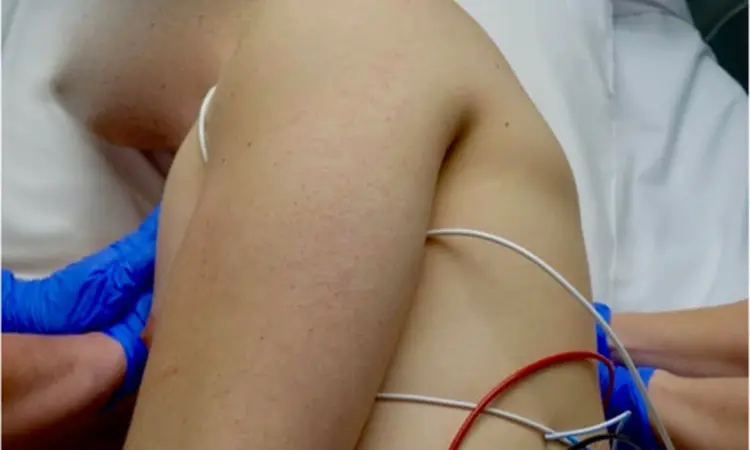- Home
- Medical news & Guidelines
- Anesthesiology
- Cardiology and CTVS
- Critical Care
- Dentistry
- Dermatology
- Diabetes and Endocrinology
- ENT
- Gastroenterology
- Medicine
- Nephrology
- Neurology
- Obstretics-Gynaecology
- Oncology
- Ophthalmology
- Orthopaedics
- Pediatrics-Neonatology
- Psychiatry
- Pulmonology
- Radiology
- Surgery
- Urology
- Laboratory Medicine
- Diet
- Nursing
- Paramedical
- Physiotherapy
- Health news
- Fact Check
- Bone Health Fact Check
- Brain Health Fact Check
- Cancer Related Fact Check
- Child Care Fact Check
- Dental and oral health fact check
- Diabetes and metabolic health fact check
- Diet and Nutrition Fact Check
- Eye and ENT Care Fact Check
- Fitness fact check
- Gut health fact check
- Heart health fact check
- Kidney health fact check
- Medical education fact check
- Men's health fact check
- Respiratory fact check
- Skin and hair care fact check
- Vaccine and Immunization fact check
- Women's health fact check
- AYUSH
- State News
- Andaman and Nicobar Islands
- Andhra Pradesh
- Arunachal Pradesh
- Assam
- Bihar
- Chandigarh
- Chattisgarh
- Dadra and Nagar Haveli
- Daman and Diu
- Delhi
- Goa
- Gujarat
- Haryana
- Himachal Pradesh
- Jammu & Kashmir
- Jharkhand
- Karnataka
- Kerala
- Ladakh
- Lakshadweep
- Madhya Pradesh
- Maharashtra
- Manipur
- Meghalaya
- Mizoram
- Nagaland
- Odisha
- Puducherry
- Punjab
- Rajasthan
- Sikkim
- Tamil Nadu
- Telangana
- Tripura
- Uttar Pradesh
- Uttrakhand
- West Bengal
- Medical Education
- Industry
Using two sets of defibrillation pads more effective treatment strategy for obese atrial fibrillation patients: Study

USA: A second set of defibrillation pads for dual direct current cardioversion (DDCV) safely improved the success of the procedure for atrial fibrillation patients (AF) with obesity, a randomized trial has shown.
"Only 2% of obese patients failed their first cardioversion attempt with the dual approach versus 14% treated with a standard single direct current cardioversion," the researchers reported. The findings were presented at the American Heart Association (AHA) annual meeting, Scientific Session 2023, by Joshua D. Aymond, MD, of Ochsner Health in New Orleans.
After multivariate analysis -- controlling for sex, age, BMI, left ventricular ejection fraction, left atrial volume index, obstructive sleep apnea, congestive heart failure, and antiarrhythmic drug use -- the odds of cardioversion failure were 12.6-fold higher with single DCCV.
External direct current cardioversion is a mainstay treatment to restore sinus rhythm in AF patients. However, a significant portion of the obese population fails the traditional cardioversion techniques using a single set of defibrillator pads. Failure raises the risk for adverse events related to multiple shocks and loss of cardiac benefits from restoring sinus rhythm.
There is a lack of alternative treatment strategies. Dual-DCCV, in which simultaneous shocks are delivered through 2 sets of defibrillation pads, is a potentially more effective approach. Therefore, the research team aimed to assess the safety and efficacy of dual-DCCV compared to single-DCCV in obese patients with atrial fibrillation in a multicenter randomized controlled trial.
The trial included patients with obesity (BMI ≥35 kg/m2) and atrial fibrillation who were undergoing elective DCCV. 200 patients (65.5±10.7 years, 37% females) were blinded and randomized in the ratio of 1:1 to single-DCCV or dual-DCCV. Irrespective of treatment assignment, two pairs of electrode patches were placed on all participants.
The single-DCCV group received a 200J shock using only the primary electrode pair. The dual-DCCV group received synchronized shocks using both the primary and secondary electrode pairs, totalling 400J. In both groups, failure of the first cardioversion was followed by a maximum of 2 additional dual-DCCV attempts.
The study's primary endpoint was determined as successful cardioversion to sinus rhythm immediately after the first DDCV. Secondary safety outcomes were monitored.
The study revealed the following findings:
- Cardioversion failed more often with single-DCCV compared to dual-DCCV (14% vs. 2%).
- Dual-DCCV predicted successful cardioversion (OR 16.7) even after backward stepwise correction starting with all variables for which.
- Following an initially unsuccessful single DCCV, subsequent shocks (all dual) were successful in all patients: 12/14 following the second DCCV and 2/14 following the third DCCV.
- There was no difference in the rating of post-procedure chest discomfort (median in both groups=0/10). There were no complications.
"Dual-DCCV results in higher cardioversion success compared to conventional single-DCCV, without any increase in complications in obese patients with atrial fibrillation undergoing DCCV," the researchers concluded.
Reference:
Aymond J, et al "Efficacy and safety of dual direct current cardioversion versus single direct current cardioversion as an initial treatment strategy in obese patients with atrial fibrillation" AHA 2023.
Dr Kamal Kant Kohli-MBBS, DTCD- a chest specialist with more than 30 years of practice and a flair for writing clinical articles, Dr Kamal Kant Kohli joined Medical Dialogues as a Chief Editor of Medical News. Besides writing articles, as an editor, he proofreads and verifies all the medical content published on Medical Dialogues including those coming from journals, studies,medical conferences,guidelines etc. Email: drkohli@medicaldialogues.in. Contact no. 011-43720751


